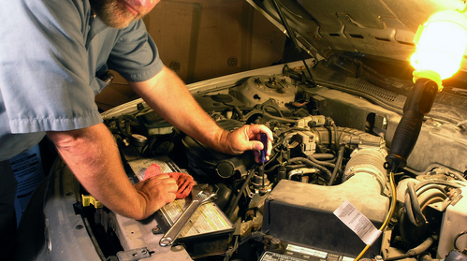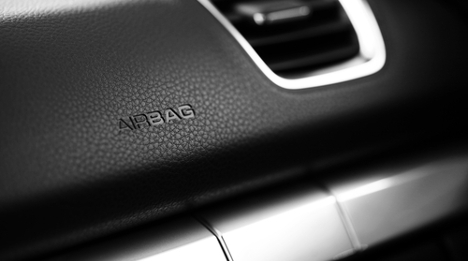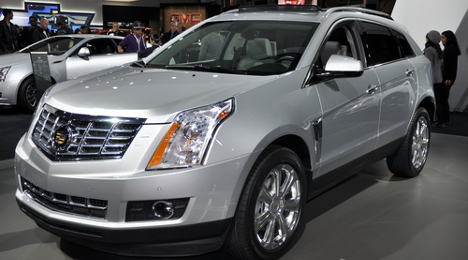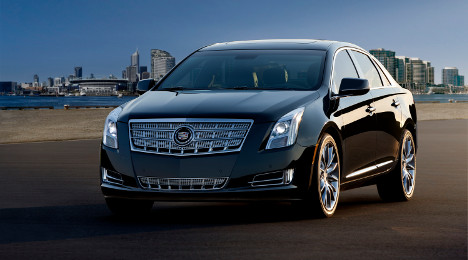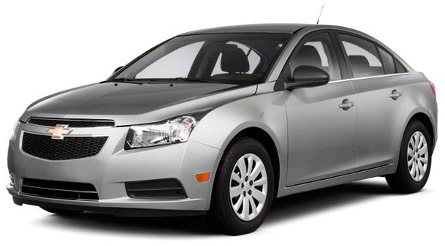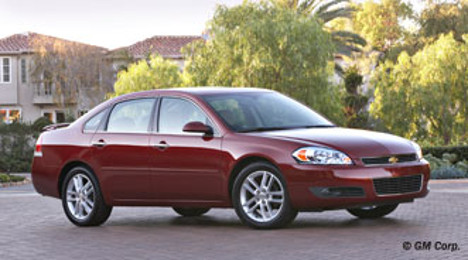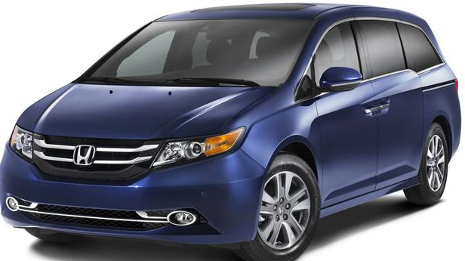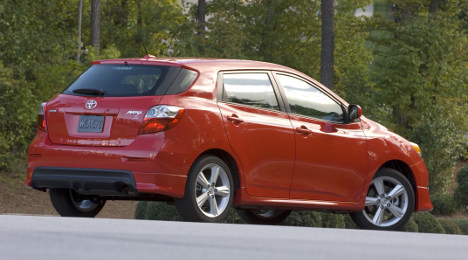The industry has seen more recalls in the past two years than ever before, leaving open recalls and consumer safety a major issue.
Since early 2014, more than 10 million Canadian vehicles have been affected by manufacturer recalls.
Cars are streaming into dealerships for fixes due to recalls, boosting service and parts business, but the amount of vehicles still on the road with outstanding safety recalls is alarming.
CarProof research revealed this issue is particularly prevalent in Manitoba. In fact, the company found more than one in 10 vehicles on the road in the province have been deemed “unsafe” due to open safety recalls.
"Our mission and brand promise is founded in providing critical information that creates trust, transparency and confidence in the end to end used car experience," says Ed Woiteshek, president and chief executive officer of CarProof. "The alarming number of vehicles on the road with open recalls is a public safety issue. It's a problem, and at CarProof we're doing everything possible to help solve it."
Specifically, data collected by CarProof shows close to 100,000 vehicles on the road in Manitoba have open safety recalls outstanding. To put that into perspective, there are only approximately 800,000 vehicles registered in Manitoba.
“This means that more than one in 10 cars on the road in Manitoba have been deemed unsafe to drive by the vehicle's own manufacturer,” CaProof management pointed out.
In an effort to increase transparency in the used-car space and to help vehicle owners regain confidence in their car’s safety, CarProof is offering all Manitoban car owners a free vehicle history report.
"We are hoping that by offering these reports for free during the next few months," says Woiteshek, "Manitoba drivers will feel confident they are driving a safe car. And as important, we want to alert those consumers that are driving unsafe cars so they can be properly fixed to make our roads safer for all."
CarProof pointed out that while manufacturers and dealers have some processes in place to alert owners when a recall is issued on their vehicles, owners can often be difficult to locate, and sometimes the message isn’t received.
CarProof pointed out this move is part of an effort to increase transparency in the used-car space — a topic that has been top-of-mind for company management as of late.
In fact, at the recent Auto Remarketing Canada conference in Toronto this past April, Woiteshek announced CarProof will be heading up “The Transparency Advantage,” or TTA, an industry think tank committed to innovation and forward movement in the automotive market.
The organization and its members will work together to examine the current state of the industry, identify opportunities, commission studies and share research that will work to unite the industry around the next phase in transparency, and ultimately, help dealers buy and sell more cars, CarProof explained.
To access free accident history reports in Manitoba, visit https://mb.carproof.com/.
Fortunately for Canadian dealers, the recent agreement between Fiat Chrysler Automobiles and the National Highway Traffic Safety Administration in the United States is not expected to have any sort of negative market impacts for the brand in Canada.
That’s according to Geoff Helby, the regional director of industry solutions for the Canadian arm of ALG.
For the background on the situation in the U.S., here are the basics. On Sunday, the U.S. Transportation Secretary Anthony Foxx announced that FCA had acknowledged violations of the U.S. Motor Vehicle Safety Act’s requirement to repair vehicles with safety defects.
This is in light of a public hearing on July 2 where NHTSA officials outlined problems with FCA’s execution of 23 vehicle safety recalls covering more than 11 million defective vehicles. FCA later admitted to violating the Safety Act in three areas: effective and timely recall remedies, notification to vehicle owners and dealers, and notifications to NHTSA.
Via consent order issued by NHTSA, FCA agreed to offer owners of more than half a million vehicles with defective suspension parts the opportunity to sell their vehicle back to FCA. Owners of more than a million Jeep vehicles prone to fires will have the chance to trade in their vehicle in above market value or receive a financial incentive to have the vehicle repaired. To see the full requirements of the consent order, click here.
Helby provided some industry analysis for Auto Remarketing Canada, likening the situation to previous recalls and anticipating that FCA’s compliance will reap favorable benefits in the market.
“With rare exceptions, recalls have historically not impacted used-market values of vehicles,” Helby told Auto Remarketing Canada. “The key factor in whether the impact is negligible or negative seems to be cooperation with regulatory agencies on the part of the automaker. During the Ford Explorer rollover debacle and the Toyota unintended acceleration issue, both automakers were defiant and insisted they were not liable for any issues with their vehicles. This defiance, combined with high visibility in the mainstream media, caused a short term decline in vehicle values and brand perception.
“In all other major and minor recall campaigns, we have seen little data to suggest any negative impact,” Helby continued. “Even during the massive GM recall that prevailed through much of 2014. Thus, since FCA is now being cooperative with the effort, we expect no negative impact in market performance for the brand.”
According to LouAnn Gosselin, the head of communications at FCA Canada, it is not known at this time how many of the affected vehicles are in Canada or whether or not the owners of those vehicles will be presented a buy-back offer similar to the consent order in the U.S.
Gosselin emphasized that remedies for the recalls in question are available in Canada and urges consumers to make a service appointment to have them repaired.
"Safety is a paramount concern at FCA Canada,” Gosselin said via email correspondence with Auto Remarketing Canada. “Today’s vehicles are safer than ever. FCA Canada takes seriously the safety and satisfaction of its customers. Although the consent order announced today pertains to FCA US and NHTSA, FCA Canada is in regular communication with Transport Canada and will continue to work closely with Transport Canada officials. FCA Canada is reviewing the contents of the consent order, including the nature and population of vehicles that would potentially be affected by the order.”
Honda Canada Inc. announced this week it is launching a Safety Improvement Campaign in Canada to replace the driver’s front airbag inflator in certain 2001 through 2010 Honda and Acura vehicles.
The airbags in question were designed by Takata, and contain inflators that may rupture under intense pressure and have been the subject of 8 million recalls in the U.S. and an estimated 400,000 in Canada.
The new Honda campaign will cover approximately 700,000 vehicles in Canada, and owners will be notified by mail and requested to bring their cars to an authorized Honda/Acura dealer for replacement of the affected part.
Though initial concern for the airbags erupting was tied to regions of high temperature and high absolute humidity, Honda explained this latest action is to address the concerns of customers living outside these areas, “thereby supporting the ongoing investigation into this issue currently underway in the United States.”
To data, Honda Canada is not aware of any reported claims of injuries or deaths in Canada relating to a ruptured airbag inflator of any Takata produced airbag in a Honda or Acura vehicle, though the Takata airbags in question have proved dangerous in other vehicles and have been linked to five deaths.
And automakers aren’t the only ones reacting to the Takata airbag proceedings — the Merchant Law Group announced it is launching Canada-wide class action litigation in Ontario and Saskatchewan regarding the defective airbags just this week.
The affected Canadian models are as follows (certain specific vehicles only):
- 2001-2007 Honda Accord with 4-cylinder engines
- 2001-2002 Honda Accord with V6 engines
- 2001-2005 Honda Civic
- 2002-2006 Honda CR-V
- 2003-2010 Honda Element
- 2002-2004 Honda Odyssey
- 2003-2007 Honda Pilot
- 2006 Honda Ridgeline
- 2003-2006 Acura MDX
- 2002-2003 Acura TL
- 2002 Acura CL
Transport Canada recently announced Cadillac’s recall of the SRX. Roughly 17,500 examples of the crossover with model years ranging from 2010 to 2015 have been recalled for a possible rear suspension issue.
According to the report, the rear suspension toe link jam nuts may not have been tightened to specification, potentially leading to the nuts loosening and eventually separating, allowing the rear wheel to turn inboard or outboard. This event could affect the vehicle’s handling and could result in a crash resulting in injury and/or property damage.
Dealers have been directed to inspect the potentially affected vehicles to ensure the rear suspension toe link nuts are tightened to specification and, if required, the rear suspension toe link will be replaced.
Following the Canada recall, it was also announced today that General Motors has issued a recall for the SRX in the United States, as well, totaling 290,107 SRX potentially affected in the U.S. with the same issue. GM has also issued a recall in the U.S. for 2011-2012 Saab 9-4X vehicles for the same issue.
Both Chrysler Group and General Motors announced more recalls this week, adding to the unprecedented list of reported issues this year.
Chrysler Group is recalling an estimated 230,760 sport utility vehicles around the world —15,898 of which are in Canada — to install a new part to prevent a fuel pump issue that the company says could cause the vehicles to stall or not start.
Chrysler said it had discovered in an internal review that some fuel-pump relays in certain 2011 Jeep Grand Cherokee and Dodge Durango SUVs were susceptible to deformation.
The fuel-pump relay is inside an integrated power module that helps manage other vehicle function, but none of those other functions are affected, Chrysler said.
Chrysler Group isn’t aware of any accidents or injuries related to the issue.
The company will be contacting customers when they can schedule service.
The recall also covers an estimated 188,723 SUVs sold in the United States, 7,126 in Mexico and 19,013 outside of North America, Chrysler said.
Chrysler said it would advise customers when they can schedule service.
GM Recalls Continue
Over at General Motors, the company had yet another large recall to announce this week.
The company recalled more than 220,000 cars to correct a brake problem that could increase the risk of fire.
The recall affects GM's Cadillac XTS model from 2013 and 2014 and recent versions of the Chevrolet Impala. Most of the owners are in the U.S. and Canada.
The majority of the vehicles, 205,309, are located in the U.S.
The latest recall covers the Cadillac XTS from the 2013 through 2015 model years and manufactured between Feb. 14, 2012 and Aug. 22. The recall also includes the Chevrolet Impala from the 2014 and 2015 model years and manufactured between Jan. 15, 2013 and Aug. 22.
In the affected vehicles, the National Highway Traffic Safety Administration indicated the electronic parking brake piston actuation arm may not fully retract causing the brake pads to stay partially engaged.
“Brake pads that remain partially engaged with the rotors may cause excessive brake heat that may result in a fire,” the U.S. regulator said.
GM told NHTSA it will notify owners, and franchised dealers will update the electronic parking brake software, free of charge. The recall is expected to begin this month.
GM says it is not aware of any deaths or injuries resulting from the defect.
After recalling 187,000 units the week before, General Motors Canada announced late last week yet another safety issue involving air bag inflators – bringing the recall count closer to 50 this year for the GM automaker.
The most recent recall covers 57,706 vehicles in Canada, involving a variety of models.
First up, dealers will replace the driver’s side air bag inflator in 4,066 2013-2014 model year Chevrolet Cruze sedans in Canada.
“The inflator in the driver’s front air bag may rupture and/or the air bag may not inflate during air bag deployment,” the company statement said. “A rupture could propel metal pieces of the inflator into the vehicle cabin, possibly striking and seriously injuring the driver or other vehicle occupants.”
Furthermore, if the inflator does not inflate the air bag, there is an increased risk of injury to the driver.
The company is aware of one injury related to the issue.
Next up, dealers will recalibrate transfer case control module software in 53,607 full-size pickup trucks and SUVs in Canada.
Affected are four-wheel-drive versions of the 2014-2015 Chevrolet Silverado and GMC Sierra; the 2015 Chevrolet Tahoe and Suburban; and the 2015 GMC Yukon and Yukon XL.
“In these vehicles, the transfer case may electronically switch to neutral without input from the driver,” the company explained. “If this occurs while a vehicle is in motion, no power will go to the wheels. If the vehicle is stopped or parked, it may roll away if the parking brake is not set.”
GM is not aware of any crashes or injuries related to this particular issue.
Lastly, dealers will also replace the two rear shock absorbers in 33 2014 model year Chevrolet Corvettes in Canada with the FE1 or FE3 suspension to repair a possible insufficient weld in the rear shocks that could lead to a fracture and/or reduce the shocks’ service life.
GM is not aware of any crashes or injuries related to this issue, either.
Shortly after GM announced this recall last week, a group of Toronto dealers launched a suit against GM Canada and parent company General Motors Co.
a group of prominent GM Canada dealers is suing the company and its parent General Motors Co.
Adria MacKenzie, corporate communications manager at GM Canada told Auto Remarketing Canada this morning, "A number of Toronto dealers have taken legal action against GM. The claims are without merit, and we plan to defend against them vigorously."
"We will continue to be focused on our customers," MacKenzie added.
For more information regarding the suit, see the following Auto Remarketing Canada story:
Dealers File Suit Against GM Canada & Parent Co.
General Motors Canada announced this week yet another recall for the GM brand, bringing the company’s total count for the year closer toward 50.
In the company’s 44th recall this year — General Motors will rework or replace the ignition keys on 187,972 cars in Canada from the 2000 to 2014 model years.
In these vehicles, the ignition switch may inadvertently move out of the “run” position if the key is carrying extra weight and experiences some jarring event.
“The use of a key with a hole, rather than a slotted key, addresses the concern of unintended key rotation due to a jarring road event, such as striking a pothole or crossing railroad tracks,” the company said.
The recall’s total North American impact is significant, covering more than 3.3 million units, and GM is aware of eight crashes and six injuries related to this recall.
The automaker expects to spend up to approximately $700 million in Q2 for recall-related repairs.
The recall impacts the following models: 2005-2009 Buick LaCrosse, 2006-2014 Chevrolet Impala, 2000 to 2005 Cadillac Deville, 2004-2011 Cadillac DTS, the 2006-2011 Buick Lucerne, the 2004 and 2005 Buick Regal LS and GS, and the Chevy Monte Carlo from the 2006 through 2008 model years.
This recall comes on the heels of a similar issue announced back in February, when the company recalled 2.6 million Chevrolet Cobalts and other small cars.
If the ignition switch moves out of the “run” position, there is an effect on power steering and power braking. In addition, the timing of the key movement out of the “run” position, relative to the activation of the sensing algorithm of the crash event, may result in the air bags not deploying, the company explained.
To fix these vehicles, GM said it will add an insert to the ignition keys of the recalled vehicles to close the slot and leave a 4×6-millimeter hole through which the key ring could be attached.
On the other hand, in vehicles where the key cover has been worn, new keys with holes instead of slots will be provided free of charge.
Rework of the keys — adding key inserts — at GM dealerships is expected to begin in the next few weeks. Until the rework or replacement is completed, owners of the recalled cars are urged to remove additional weight from their key chains and drive with only the ignition key, the company shared.
In addition to the ignition key recall, GM also announced Canadian recalls for 13,764 vehicles in these four actions:
- 6,135 model year 2013-14 Cadillac ATS and 21,863 model year 2014 Cadillac CTS sedans for transmission problems.
- 6,778 2015 Chevrolet Silverado 2500/3500 HD and 2015 GMC Sierra 2500/3500 GMC Sierra HD to inspect for proper attachment of power steering hose clamps to the power steering pump.
- 790 model year 2011 Cadillac CTS sedans with AWD for possible gasket leaks, where the constant velocity joint meets the rear propeller shaft may cause the rear propeller shaft to separate or become loose, making contact with the vehicle floor above and causing the rollover sensor to deploy the roof rail air bags.
- 61 model year 2014 Chevrolet Corvettes with optional Competition Sport Seats, because an unbelted child and door trim may block the passenger seat side air bag vent in a deployment.
The number of recalls from General Motors continues to grow, as this week's issues added to the list of more than 25 GM recalls to come through this year, totaling over 13 million vehicles.
General Motors Canada announced this week it is recalling about 181,500 vehicles in three separate recalls.
This news comes on the heels of GM’s recall of over two million vehicles worldwide for ignition-switch defects that sparked a firestorm from Canadian and U.S. authorities. This recall was linked to 13 deaths. The company is now facing a $35 million fine issued by the U.S. government for failing to disclose information about safety issues in an expedient manner.
The most recent recalls in Canada includes a variety of models — and involves a pair of stop sales:
- 75,700 Buick Enclave, Chevrolet Traverse, GMC Acadia full-size crossovers from the 2009-2014 model years and Saturn Outlooks from 2009 and 2010 are being recalled because front safety lap belt cables can fatigue and separate over time. In a crash, a separated cable could increase the risk of injury to front seat passengers.
In this recall, the company explained, “The flexible steel cable that connects the safety belt to the vehicle at the outside of the front outboard seating positions can fatigue and separate over time as a result of occupant movement into the seat.” GM has issued a stop-sale on these vehicles until repairs are made.
- 105,700 of the previous generation four-speed automatic transmission Chevrolet Malibu and from the 2004-2008 model years and Pontiac G6 from the 2005-2008 model years are being recalled because of a shift cable that could wear out over time, resulting in mismatches of the gear position indicated by the shift lever.
“The previous generation Malibu, Malibu Maxx and Pontiac G6 were added to an April 29 recall for certain four-speed transmission Aura models from the 2007-2008 model year,” the company stated.
The Malibu and G6 vehicles equipped with a four-speed automatic transmission have a condition in which the transmission shift cable may fracture.
When the fracture occurs, the driver may not be able to select a different gear, remove the key from the ignition or place the transmission in park. The OEM is aware of 18 crashes and one injury among the 4-speed Malibu and G6 population in the U.S. Dealers will replace the shift cable and attachment bracket at no charge to the customer.
- 57 Cadillac Escalades and Escalade ESVs from the 2015 model year will be recalled because an insufficiently heated plastic weld that attaches the passenger side air bag to the instrument panel assembly could result in a partial deployment of the air bag in the event of a crash. All affected vehicles are in dealer inventory and will be repaired prior to sale, and GM has stopped the sale of the 2015 Escalade and Escalade ESV vehicles. In these vehicles, the passenger airbag module is attached to a chute adhered to the backside of the instrument panel with an infrared weld that was not sufficiently heated.
Overall, the company reported there have been no fatalities associated with these recalls.
Going back to the March recalls, Merchant Law Group LLP launched a Canada-wide class action against the manufacturer concerning the recent recall of an ignition-switch allegedly linked to 13 accidental deaths.
And GM chief executive officer Mary Barra participated in both U.S. House and Senate hearings to investigate the ignition-switch recall.
These events and others have spurred GM to ramp up product investigation, adding 35 product investigators since the beginning of 2014, and has initiated 29 safety and non-compliance recalls in the U.S. and Canada so far this year.
The company expects to take a charge of up to approximately $400 million in the second quarter, due to the influx of recalls.
For more information on GM’s spring recalls, see the following Auto Remarketing Canada story here.
Canadian Class Action Launched Against GM
Honda announced this week it is recalling 1,501 2014-model-year Odyssey vehicles in Canada to repair the electrical coupler — a component in the passenger side curtain airbag system.
“During assembly of the electrical coupler for the passenger side curtain airbag, the shorting terminal, which is used to prevent deployment of the airbag before it is assembled into the vehicle, may have been damaged,” Honda officials said in the recall statement released Tuesday.
The damaged shorting terminal may cause the Supplemental Restraint System (SRS) indicator to illuminate as well as prohibit the side curtain airbag from deploying during a crash, increasing the risk of injury.
That said, no crashes or injuries have been reported related to this issue, as of yet. The corrections will be made free of charge.
Mailed notification to customers will begin in May.
In addition to contacting customers by mail, owners of these vehicles will be able to determine if their vehicles require repair by going to www.honda.ca/recalls or by calling 1-888-9HONDA9.
Toyota is recalling more than 6 million vehicles worldwide in five actions covering nearly 30 different models. Of those actions, two impact Canada.
Of the more than 6 million units involved in the recalls announced this morning by Toyota, over 500,000 of these vehicles are in Canada.
According to a statement from Toyota Motor Corp. posted to Bloomberg.com, the five recalls tally up to 6.76 million vehicles spanning 27 Toyota models, the Pontiac Vibe and Subaru Trezia. The statement explains that with some models including in more than one action, the official number of units to be fixed is 6.39 million. The automaker also said in the statement that it doesn’t know of any crashes, injuries or deaths from these issues.
Toyota Motor Sales USA provided sister publication Auto Remarketing a numbers breakdown of the five issues being addressed, only the top two of which impact Canada
Below are the global numbers of vehicles affected by these actions:
— Spiral cable: 3.5 million
— Seat track: 2.32 million
— Steering column bracket: 760,000
— Windshield wiper motor: 169,000
— Starter motor: 20,000
Here’s how that shakes out in Canada, per a pair of statements released this morning from Toyota Canada Inc.:
Spiral cable: Toyota Canada Inc., announced that it will conduct a voluntary safety recall involving approximately 360,963 model year 2009-2010 Corolla, model year 2009-2010 Matrix, Model Year 2008-2010 Highlander, model year 2009-2010 Tacoma, model year 2006-2008 RAV4 and model year 2006-2010 Yaris vehicles.
“The driver’s airbag module in the involved vehicles is attached to a spiral cable assembly with electrical connections that could become damaged when the steering wheel is turned,” the company said.
If this occurs, the air bag warning lamp will illuminate. In addition, the driver’s air bag could become deactivated, causing it to not deploy in the event of a crash.
“Toyota is currently preparing the remedy for this condition. For all involved vehicles, the spiral cable will be replaced with an improved one at a Toyota dealership. Once preparations are complete, Toyota will send an owner notification letter by mail and the remedy will be provided at no charge,” the statement reads.
Seat track: Toyota Canada Inc., announced that it will conduct a safety recall involving approximately 152,438 vehicles consisting of certain model year 2006-2010 Yaris Hatchback vehicles; certain model year 2007-2010 Yaris Sedan vehicles; and certain model year 2010 Scion xD vehicles.
In the seat rail of the driver seat of the involved vehicles and also the front passenger seat of three-door models, the springs used for the mechanism which lock the seat rail in its adjusting positions could break.
“This can happen if the seat is adjusted forward and/or rearward with high frequency. If a seat rail spring breaks, the seat may not lock into the adjusted position. If the vehicle is operated with a broken seat rail spring, the seat could move in the event of a crash, increasing the risk of injury to the occupant. Toyota is not aware of any accidents or injuries caused by this condition,” the statement explained.
There are two things a vehicle occupants may find if the issue has impacted his or her car, as listed by the company:
— If both of the springs have broken, the seat will not lock into the adjusted position.
— In limited instances, if a spring has broken and becomes stuck in the seat rail, the seat may only be capable of forward movement.
“Toyota is currently preparing the remedy. Once preparations are complete, owners of vehicles subject to this recall will receive an owner notification letter by mail. The remedy, when available, will involve replacement of the seat track assembly at no charge to the customer,” the company said.
Information is available to customers at www.toyota.ca/recall and the Toyota Customer Interaction Centre at 1-888-TOYOTA-8 (1-888-869-6828) or www.scion.ca and Scion Canada 1-866-9-SCION-1 (1-866-972-4661).
Editor's Note: Auto Remarketing editor Joe Overby contributed to this report.

